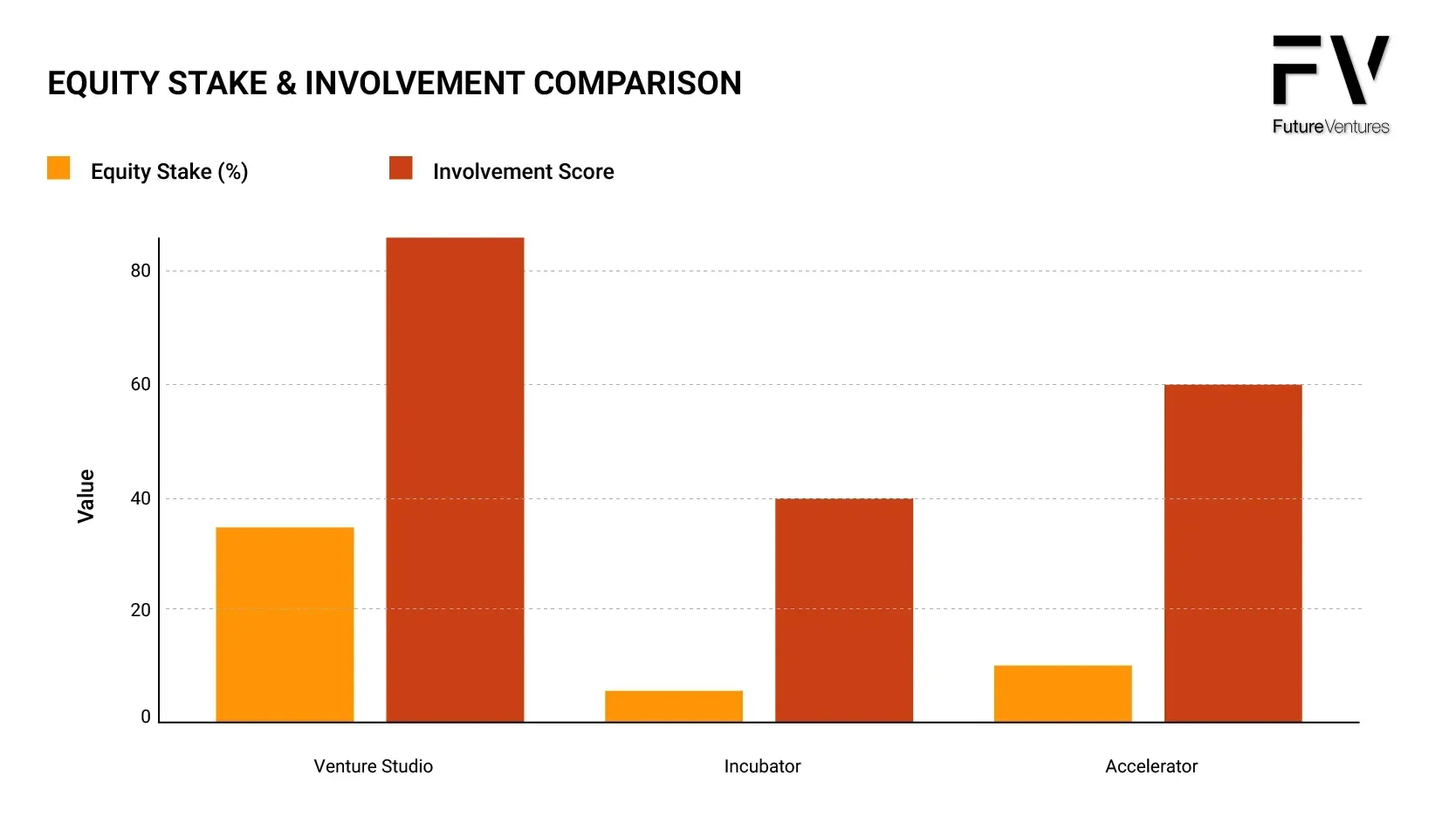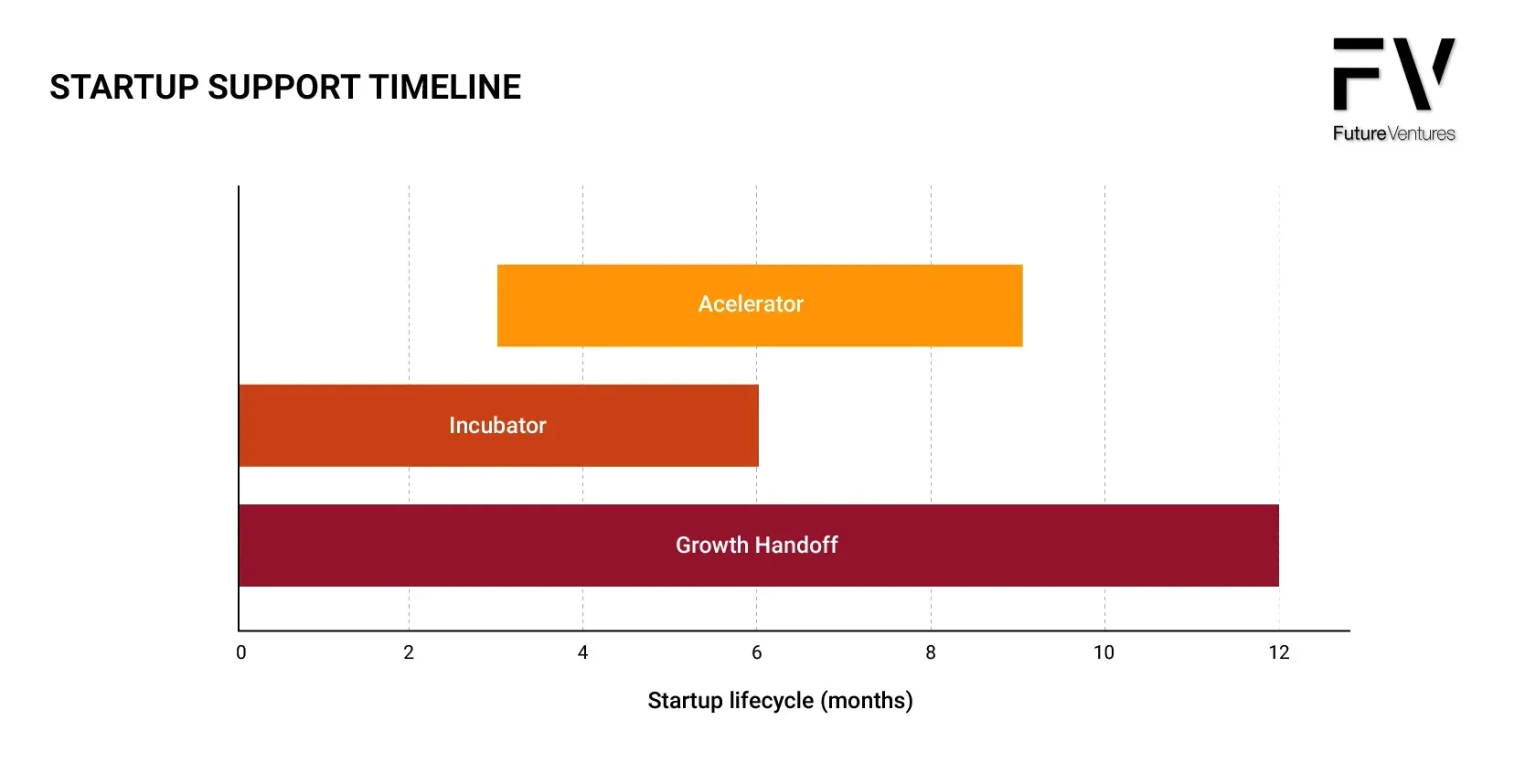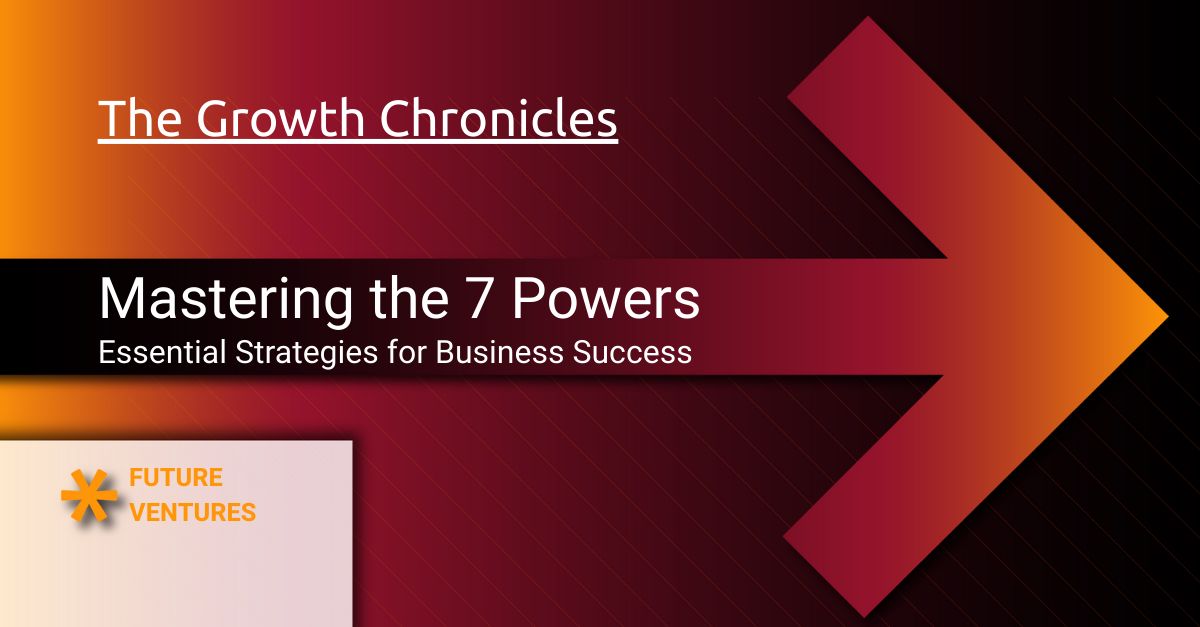Venture Studio vs. Incubator: Which Model Suits Your Startup Best?
The startup ecosystem resembles a complex evolutionary system where only the fittest survive. Traditional startups face a staggering mortality rate. 90% die before gaining significant traction.
But what if you could dramatically improve those odds?
Enter the world of venture studios and incubators, where the traditional “figure-it-out-yourself” approach is replaced with structured systems designed to increase your chances of survival. These systems often include incubator or accelerator programs, which support startups at different stages. Incubators focus on developing early-stage ideas into viable products, while accelerators help scale these startups after initial success.
Today’s guide dissects these models with surgical precision to help you choose your optimal path forward.
Understanding Your Support Options
What is a Startup Incubator?
Incubators are the kindergartens of the startup world—nurturing environments where founders learn the basics before entering the cutthroat business playground. They don't build the companies; they create conditions for entrepreneurs to build their own.
Imagine walking into a collaborative workspace filled with other wide-eyed founders, all sharing the communal coffee machine and trading war stories. That's incubator life. These programs provide the foundational infrastructure—office space, internet access, basic legal templates—while you figure out if your brilliant idea actually solves a real problem.
Incubators typically engage with startups during the first 6 months of their lifecycle, providing a moderate level of hands-on support (scoring about 40/100 on the involvement scale) while taking minimal equity (around 7%). They excel at helping you navigate regulatory requirements, connect with mentors and build your initial network.
What is a Venture Studio?
Venture studios are the SEAL teams of company building—elite, experienced, and equipped with specialized tools to construct businesses with military precision. Unlike incubators, studios don’t just provide space and occasional guidance; they actively co-found and co-build your company.
Most venture studios can accelerate the timeline from concept to market launch significantly, often achieving this within 6-12 months.
A venture studio is essentially a co-founder with supernatural powers—they’ve done this dozens of times before and maintain dedicated teams for every function your startup needs: product, engineering, marketing, sales, finance, and HR. They’re not mentors giving occasional advice; they’re in the trenches with you, day in and day out.
The data indicates that venture studios exhibit the highest level of involvement (90/100) and generally acquire a significant equity stake (usually 35%). Their support spans the entire startup lifecycle—typically lasting 12 months or longer—and their model is crafted to systematically mitigate risks at every stage of development.
Key Differences between Incubators and Venture Studios
Incubators vs. Venture Studios: A Comparison
The fundamental distinction lies in their operational approach:
- Incubators are facilitators
- Venture studios are builders.
| Feature | Venture Studio | Incubator | Accelerator |
|---|---|---|---|
| Equity Stake | 35% (20-80% range) | 7% (5-10% range) | 10% (5-15% range) |
| Involvement Level | 90/100 | 40/100 | 60/100 |
| Support Duration | 12 months | 6 months | 3-6 months |
| Idea Source | Often generated internally | External entrepreneurs | External startups |
| Primary Value | End-to-end company building | Nurturing environment | Rapid scaling |
| Funding Provided | $500K-$2M+ | Limited or none; often rely on venture capital firms to supply the necessary capital for startups in exchange for equity | $50K-$150K |
| Time to Seed | 10.7 months | 36 months (traditional) | Varies |

Venture studios roll up their sleeves and get their hands dirty in day-to-day operations. They don’t just advise—they execute. When your marketing strategy needs work, they don’t recommend a course; they bring in their CMO to redesign it. Incubators point you to resources; studios become your resources.
Accelerator Programs: A Different Approach
If incubators are kindergartens and venture studios are elite military units, accelerators are high-intensity fitness boot camps—they take reasonably fit companies and put them through an intense training regimen to prepare them for the Olympics of business growth. An accelerator program is a structured, time-limited initiative that helps startups transition from early stages to significant growth. These programs provide rigorous involvement and support, focusing on mentorship, networking, and preparing participants for investor engagement.
Accelerators are looking for startups that have moved beyond ideation. You need a functioning product, early evidence of traction, and a cohesive team. Their programs typically run 3-6 months with clear milestones and culminate in a “demo day” where you pitch to investors.
With a moderate-to-high involvement score of 60/100 and equity stakes averaging 10%, accelerators occupy the middle ground between incubators and studios. They focus primarily on months 3-8 of a startup’s lifecycle, targeting rapid growth rather than foundational development.
Benefits and Drawbacks
Advantages of Incubators and Venture Studios
Incubator Strengths:
- Lower equity cost: Your ownership remains largely intact, with only about 7% going to the incubator
- Community-driven: Access to peer support and collaborative problem-solving
- Autonomy: You maintain control of strategic decisions
- Flexibility: Freedom to pivot without complex stakeholder approval
- Networked learning: Exposure to diverse perspectives from mentors and other founders
Venture Studio Strengths:
- Drastically higher success rates: Studios reduce the 90% startup failure rate by systematically eliminating common failure points
- Speed advantage: Studio startups reach seed funding 25.3 months faster than traditional ventures
- Resource optimization: Shared services across portfolio companies create economies of scale
- De-risked launch: Experienced operators handle critical early execution
- Funding certainty: Studios typically provide initial capital and connections to follow-on investors
- Comprehensive expertise: Access to specialists across all business functions
- Streamlined process: Startup studios streamline the startup process by utilizing established processes and shared resources, thereby reducing risks and enhancing the chances of success
Disadvantages of Incubators and Venture Studios
Incubator Limitations:
- Limited resources: Basic support may be insufficient for complex businesses
- Generic guidance: Often lacks industry-specific expertise
- Minimal funding: May not provide direct investment
- Brief engagement: Support typically ends after 6 months
- Self-directed: You're still responsible for building critical functions from scratch
Venture Studio Tradeoffs:
- Significant equity dilution: You'll give up approximately 35% ownership—sometimes more
- Reduced autonomy: Major decisions often require studio alignment
- Structured approach: May constrain creative experimentation
- Higher expectations: Pressure to achieve accelerated growth milestones
- Potential misalignment: Studio portfolio strategy may occasionally conflict with company-specific needs
Choosing the Right Model
Factors to Consider
The decision between incubation and studio models requires brutal honesty about your capabilities, resources, and goals. Consider:
- Your experience level: First-time founders benefit significantly from the expertise of venture studios. The time to reach product-market fit and secure a seed round is two to three times faster.
- Capital requirements: How much funding do you need to reach a minimum viable product?
- Technical complexity: Does your product require specialized engineering talent?
- Market timing: Is there a narrow window of opportunity that demands rapid execution? If there’s an idea dependent on regulatory capture, then a venture studio might be the best option.
- Resource gaps: Which critical functions can you handle competently and which need support?
- Control sensitivity: How important is maintaining decision-making authority?
- Equity comfort: What ownership percentage are you willing to exchange for support?
- Timeline pressure: How quickly must you demonstrate traction to investors or customers?
Startup Support Timeline

Which Model Is Right for Your Startup?
Choose an Incubator if you:
- Have significant domain expertise but limited startup experience
- Possess a well-defined concept needing refinement rather than validation
- Can assemble and fund core team functions independently
- Value learning and community over hands-on operational support
- Prefer slower, more controlled growth with higher ownership retention
- Need primarily networking and mentorship rather than execution assistance
Choose a Venture Studio if you:
- Need comprehensive support across multiple business functions
- Want to dramatically accelerate time-to-market
- Are building a complex product requiring diverse expertise
- Value systematic risk reduction over complete autonomy
- Prefer proven playbooks to entrepreneurial experimentation
- Are comfortable with significant equity dilution for higher success probability
- Understand that venture studio startups compared to traditional startups have significantly higher long-term success rates, enhanced funding success, and reduced time-to-market
Choose an Accelerator if you:
- Have already developed an MVP with early traction
- Need connections to institutional investors for scaling
- Benefit from structured growth curriculum and milestones
- Want focused, intensive support for a defined period
- Are preparing for significant funding rounds
Industry Insights
The Landscape of Incubators and Accelerators
The company-building ecosystem has experienced explosive growth. Ten years ago, approximately 130 venture studios operated globally; today, that number exceeds 720. This growth reflects increasing specialization—studios now focus on specific verticals like B2B SaaS, healthcare, fintech, or consumer products.
This specialization creates interesting opportunities for founders. Rather than generic support, you can now partner with studios possessing deep domain expertise in your specific market. The best studios combine startup methodologies with industry-specific knowledge, creating a formidable advantage.
Meanwhile, corporate incubators have emerged as established companies seek to foster innovation without disrupting core operations. These programs leverage corporate resources, distribution channels, and customer relationships while maintaining the agility of startup structures.
The Rise of Venture Studios
The venture studio model is gaining traction for one simple reason: it works. Traditional startups face daunting odds—a Harvard Business School study reveals that 75% of venture-backed startups never return capital to investors, with overall failure rates approaching 90%. Against this backdrop, venture studios' systematic approach to company building delivers compelling advantages.
Studios have collectively raised over $21 billion, though funding remains concentrated—the top 20 studios control approximately 80% of total funding. This concentration is beginning to disperse as the model gains validation through successful exits and superior performance metrics.
The most significant competitive advantage for venture studios is time compression. Studio startups reach seed funding in 10.7 months compared to approximately 36 months for traditional ventures—an acceleration that creates substantial value in time-sensitive markets.
Disrupting the Venture Landscape
The venture studio model is revolutionizing the traditional venture landscape by offering a new paradigm for launching startups. Unlike the conventional approach, where founders often struggle to secure resources, funding, and expertise, venture studios provide a comprehensive platform that addresses these needs head-on. This model is particularly advantageous for early-stage startups, which typically face significant hurdles in their initial phases.
Venture studios are essentially startup factories, equipped with experienced entrepreneurs, investors, and industry experts who work collaboratively to build and scale new ventures. These studios don’t just offer advice; they actively participate in the creation and growth of the startups, providing hands-on support across various business functions. This involvement significantly reduces the risk of failure, which is a common fate for many early-stage startups.
The venture studio model is designed to systematically eliminate common failure points by offering a structured environment where startups can thrive.
For instance, many venture studios have dedicated teams for product development, marketing, sales, and finance, ensuring that experts handle each aspect of the business. This holistic approach not only accelerates the time-to-market but also enhances the overall quality and viability of the startups.
Moreover, venture studios typically provide initial capital and have strong connections with follow-on investors, ensuring that startups have the financial backing they need to grow. This funding certainty, combined with the comprehensive support system, makes venture studios an attractive option for early-stage startups looking to maximize their chances of success.
Real-World Examples
Successful New Ventures
Venture studios have produced notable successes across diverse industries:
- Science Inc. built and exited Dollar Shave Club (acquired by Unilever for $1 billion) by combining direct-to-consumer expertise with operational excellence.
- Atomic launched Hims (now publicly traded as HIMS) by identifying an underserved market in men's health and scaling rapidly through vertically integrated telehealth.
- High Alpha created Lessonly (acquired by Seismic) by leveraging deep B2B SaaS expertise and enterprise relationships.
- Idealab, the original venture studio, has created over 100 companies with substantially higher success rates than traditional venture portfolios.
These examples demonstrate how specialized knowledge, systematic processes, and shared resources can dramatically improve outcomes compared to the traditional founder-centric approach.
Corporate Venture Studios
Major corporations increasingly leverage the venture studio model to explore adjacent markets without disrupting core operations:
- Jaguar Land Rover established InMotion Ventures to develop mobility solutions beyond traditional automotive manufacturing.
- Procter & Gamble created P&G Ventures to extend into adjacent consumer categories while maintaining brand integrity.
- Bundl partners with corporations to build ventures that expand beyond existing business models.
Corporate studios combine the resources and distribution advantages of established companies with the speed and agility of startup structures. This hybrid approach enables the exploration of disruptive opportunities while managing risk and maintaining alignment with strategic objectives.
Corporate Startup Incubators
Corporate startup incubators represent a unique fusion of the agility of startups with the resources and stability of large corporations. These incubators are essentially a type of venture studio sponsored by established companies, designed to foster innovation and explore new business models. By providing resources, funding, and expertise, corporate startup incubators offer a nurturing environment for startups to grow and succeed.
For large corporations, these incubators serve as a strategic tool to stay ahead of the competition. By investing in new technologies and innovative business models, corporations can explore adjacent markets and diversify their portfolios without disrupting their core operations. This approach allows them to remain competitive in a rapidly changing business landscape.
Startups, on the other hand, benefit immensely from the support of a corporate incubator. They gain access to the corporation’s vast resources, including funding, office space, and industry expertise. Additionally, the association with a well-established brand can provide credibility and open doors to new opportunities. In exchange, the corporation typically takes an equity stake in the startup, aligning interests and ensuring mutual benefit.
Examples of successful corporate startup incubators include Jaguar Land Rover’s InMotion Ventures, which focuses on developing mobility solutions, and Procter & Gamble’s P&G Ventures, which explores new consumer categories. These incubators leverage the strengths of their parent companies while maintaining the flexibility and innovation-driven culture of a startup, creating a win-win scenario for both parties.
By combining the best of both worlds, corporate startup incubators offer a powerful platform for launching and scaling new ventures, driving innovation, and creating value for all stakeholders involved.
Conclusion: Finding the Right Fit for Your New Company
Let's be brutally honest: most entrepreneurs overestimate their capabilities, underestimate the challenges of building successful companies and the time that it will take to achieve milestones. The romantic notion of the solo founder creating billion-dollar enterprises through sheer brilliance is largely mythological—most successful startups benefit from systems, structures, and support networks that compensate for inevitable founder limitations.
The optimal support model depends on your specific circumstances:
- For first-time founders with limited resources but strong domain expertise, incubators offer affordable entry points to the startup ecosystem while preserving equity and autonomy.
- For ambitious ventures targeting rapid scaling in competitive markets, venture studios provide the execution capabilities and systematic processes needed to compress time-to-market and reduce operational risks.
- For established startups with demonstrated traction seeking acceleration, traditional accelerator programs offer focused support and investor connections to facilitate rapid growth.
The common thread across successful startups isn't solo heroics—it's the intelligent application of established methodologies, access to relevant expertise, and strategic deployment of resources against well-defined objectives. Whether you choose an incubator's collaborative community or a venture studio's comprehensive support system, the key is an honest assessment of your needs and limitations.
The most successful founders aren't those who do everything themselves—they're the ones who leverage every available resource to maximize their probability of success.










